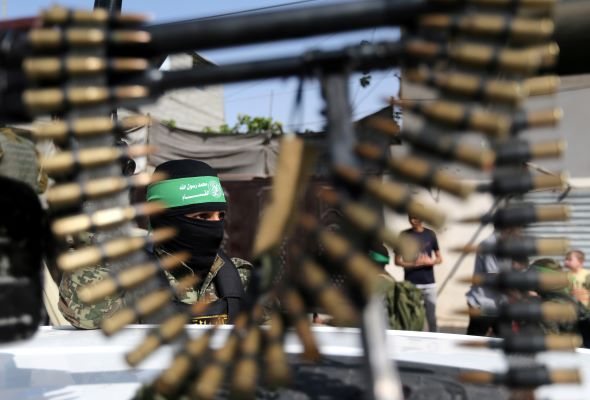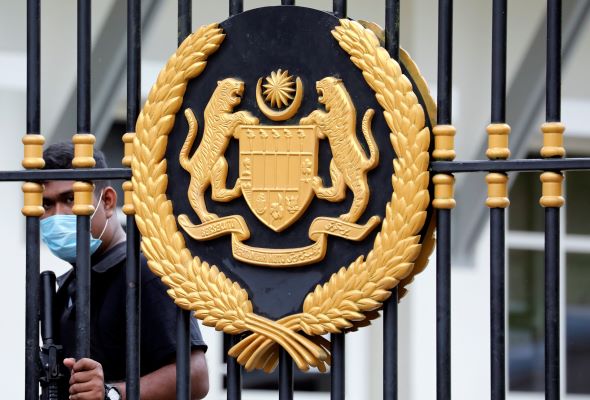
Published in Astro Awani & Asia News Today, image by Astro Awani.
ON the 54th anniversary of conclusion of the 1967-Six-Day War (June 10) and by inclusion that of the occupation of Al-Aqsa and the Dome of the Rock sitting on Al-Haram Al-Sharif (Temple Mount), this article asserts that Israel’s legitimacy is now tied to Hamas – and not the other around. Sounds like a stupendous claim. And what does that mean, anyway?
It precisely means that continuing the cycle of violence and mayhem – with both sides reacting to each other’s provocations – can only erode Israel’s moral standing in the eyes of the (wider) international community and exacerbate its guilt. In the commission of war crimes, that is.
To repeat what’s now a truism: each time Israel seeks to respond to Hamas’ “feeble” rocket attacks, as from a military standpoint and where the ratio of civilian deaths/casualties are disproportionately low compared to the air strikes, the Zionist State is only adding to its list of war crimes. Whatever Hamas does pales in comparison – a fact that can’t be objectively denied.
What about suicide missions? Again, this comes under the “feeble” response of the oppressed albeit civilian, i.e., non-military type operations.
Firstly, these don’t constitute an integral part of Hamas’ military strategy and tactics.
Unlike the now-defunct Liberation Tigers of Tamil Eelam (LTTE), suicide missions aren’t intended to serve a military objective or goal, even if at all alongside a political one.
The LTTE was noted for its extreme notoriety in the use of suicide bombers, especially in the form of its Black Tigers wing, to destroy military targets, both static and mobile. Static military targets include army camps, garrisons and air force bases on the one hand. And mobile military targets cover convoys and attacking units (armoured and infantry) on the other.
Unlike Hamas, the Black Tigers also carry out their suicide missions using vehicles packed with explosives (improvised explosive devices/IEDs), i.e., kamikaze-style.
And the fact is that the LTTE “committed more acts of suicide terrorism in the last 20 years than most other terrorist organizations combined”, according to Robert Connor in his Defeating the modern asymmetric threat (2002), PhD thesis at Naval Postgraduate School (Monterrey, California).
This in addition to two heads of state, namely the late Prime Minister Rajiv Gandhi of India in 1991 and the late President Ranasinghe Premadasa of Sri Lanka in 1993 (see “Rational Fanatics” by Ehud Sprinzak and published in Foreign Policy, 2009). There was also a failed LTTE assassination attempt on the fifth President of Sri Lanka, Chandrika Kumaratunga, in 1999.
Almost all of the suicide bombers who volunteer for the mission under the auspices and sponsorship of Hamas have had loved ones killed by the Israeli Defense Forces (IDF), including air strikes and militant settlers.
These are personal acts of revenge done out of helplessness and profound despair in the context of living under the continuing state of occupation and oppression. It’s not an act of war as such, but of resistance against oppression and aggression in one’s own land, no less, as the Palestinian Centre for Excellence (Pace) has highlighted.
Hence, suicide bombing as one of the methods of resistance is, writ large, intensely central to the struggle of the Palestinian people against colonialism and occupation (re land theft/grab and encroachment, arson and criminal burning of Palestinian olive vineyards, the sacrilege and trespass of Al-Aqsa – not limited to the compound alone but extends to the sanctuary, unwarranted movement control, profiling, air strikes, etc.).
Note that this is to be distinguished from the military strategy and tactics of Hamas as specific genera in its own right.
This isn’t meant to justify suicide missions under any circumstances as such. But it’s important that a distinction is made between that which is executed under purely asymmetrical (grossly lopsided) conditions and that which is fundamental to the pattern of warfare of the perpetrator.
Hence, unlike the situation in the then Tamil Eelam (as in areas under the LTTE’s control) which was a no-go area for the Sri Lankan military until the end of the Eelam War IV in 2009, the West Bank is under military administration via the Coordinator of Government Activities in the Territories (Cogat) as a department within the Ministry of Defense (MoD) of Israel.
So, having laid the argument that there’s no moral equivalence between Hamas and the LTTE for example, does that mean that the IDF should not respond at all?
As made in a previous EMIR Research article, “Liberating Al-Aqsa” (June 9, 2021), Israel must now reach out to Hamas and start treating the legitimate government of Gaza and resistance movement as a partner (not adversary) around the negotiation table for a two-state solution.
The IDF response would then be limited to cooperation with Hamas in the same way as it cooperates with the Palestinian security forces in the West Bank.
This, therefore, requires a paradigm shift on the part of Israel, ironically at a time when the political dynamics heavily favour right/far-right sentiments, unlike as before where there was a “pendulum” between the left and right in terms of the electoral milieu.
All the more, when Israeli politics is dominated by extreme Zionists that it’s critical to reach out to Hamas – otherwise positions on both sides will only harden to the point of no return.
In the long-term, Israel’s moral legitimacy can only suffer and decline – whilst the moral legitimacy and appeal of Hamas will only grow.
For example, it’s expected to overtake Fatah (the leading and main player within the Palestinian Liberation Organisation/PLO) in the West Bank in electoral popularity – if and when the current Palestinian Authority/PA (with the connivance of the Tel Aviv regime) lifts the indefinite postponement of both the presidential and legislative elections.
Even the West, like it or not, has to deal with Hamas sooner or later. This was a point made by Middle East expert Richard W Murphy in “Inevitable that US Will Have to Deal with Hamas” in a published interview on the website of the Council of Foreign Relations (CFR) back in 2009.
By including Hamas as a serious and respected stakeholder around the negotiation table and also working towards confidence-building involving all three parties (Israel, PA and Hamas) would promote stability in the West Bank – key to the two-state solution. Reconciliation between the PA and Hamas would benefit Israel – rather than the reverse.
It will dampen the possibility of armed clashes between the PA and Hamas resulting from the electoral fallout that could lead to a civil war – all the while under Israel’s watch. Chaos that Israel just can’t afford in political (domestic and international) and security terms.
Civil war would not only ensue in Palestinian casualties but might spill-over into the settlements (illegal) and inside Israel itself.
Whereas an entente cordiale between the PA and Hamas and the ensuing political stability enhances the political legitimacy of the former.
At the same time, the normalisation between Israel and the PA alongside Hamas will enable the Zionist State to break free from the cycle of violence and mayhem that would lessen the weight of its war crimes guilt and help influence the tide of public opinion internationally.
Such is the paradox of Israel’s moral legitimacy.
The first step is for Israel (together with Egypt) to lift the air, sea and land blockade and assist in the reconstruction of Gaza (rather than diverting overseas funds to the PA, for example). Israel has done that before, e.g., just a few years ago in 2017.
On May 18, two days before the ceasefire, Egypt had announced that it would give USD500 million to finance Gaza’s reconstruction. According to Sultan Barakat (Director of the Centre for Conflict and Humanitarian Studies at the Doha Institute), the Gaza Reconstruction Mechanism (GRM) – a temporary agreement created by the United Nations (UN) and agreed between the Palestinian Authority and Israel in September 2014 – needs to be redesigned (see “Now that the guns are silent, minds turn to reconstruction”, Al-Jazeera, May 25, 2021). Security concerns should be taken out of the equation here and put squarely around the negotiation table.
Instead of a one-dimensional approach, the Zionist State should now engage in a multi-dimensional strategy designed to secure its security and prosperity with that of the Occupied Territories conceived as an integral and inseparable whole (win-win, not zero-sum) – with the long-term view towards a viable two-state solution (understood as the pre-1967 borders)
Jason Loh Seong Wei is Head of Social, Law & Human Rights at EMIR Research, an independent think tank focussed on strategic policy recommendations based on rigorous research.

